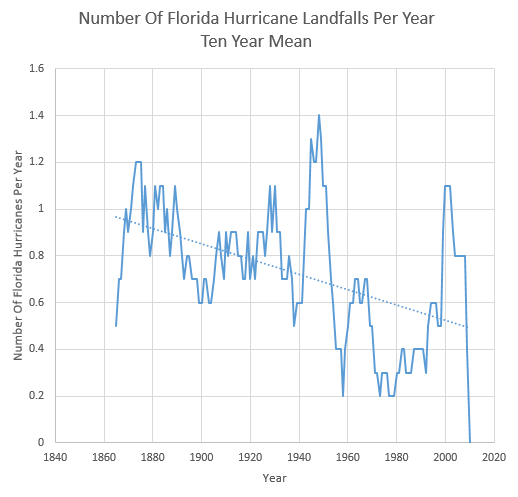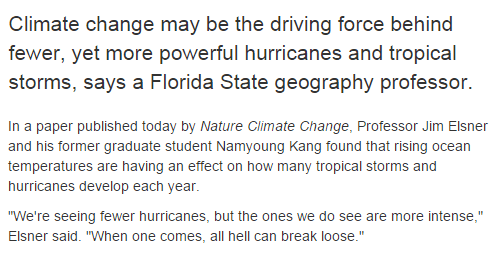Next week will mark a record ten years since Florida was hit by a hurricane. The frequency of Florida hurricane landfalls has plummeted since the 1950’s, and they only occur half as often as they did when Abraham Lincoln was president. Florida hurricanes peaked during the 1940s.
Experts say that the imaginary hurricanes which aren’t hitting Florida are more intense than the real ones they used to have
Climate change altering frequency, intensity of hurricanes — ScienceDaily




Most people don’t know what you’re reporting because the the so-called mainstream media has chosen to ignore these types statistics. It will be a long time before this bubble bursts.
But do keep up the good work. You and I will probably be dead when your work is finally allowed to see the light of day. You might be a world hero some day, but don’t hold your breath.
Professor Elsner and his former grad student need to go back to school and learn how to count from 1 to 10 it appears. Either that or they should be checked out by a psychiatrist because they are obviously suffering from delusions. Either way neither should be teaching anyone anything anywhere!
rah, they could be right:
Two men are discussing business at a high school reunion.
“What do you do these days,” asks one.
“I have a business selling low-end Rolex watches online,” answers the other.
“That’s interesting. How much do you sell them for?”
“Depending on model, between 300k and half a mill.”
“What? Nobody’s gonna pay that! Did you sell any?”
“No, but I’ll make a killing when I do.”
But Colorado the nearly decade prior to them writing this pal-reviewed BS has already proven them wrong. What was that Einstein said about the definition of insanity? Oh yea, here it is: “Insanity: doing the same thing over and over again and expecting different results.”
Sorry, rah, I had to step away before I finished:
Later that evening, the two men speak over drinks again.
“How long have you been in that Rolex business,” asks the first.
“18 years,” answers the second.
“How can you sustain a business like that?”
“I’m getting a 600k NSF grant every two years to study how long it takes for anybody to notice.”
Arent these scientists suffering from some kind of psychological disorder ?
Perhaps we are looking at the world’s first mass delusional disorder .
Delusional disorder refers to a condition associated with one or more nonbizarre delusions of thinking—such as expressing beliefs that occur in real life such as being poisoned, being stalked, being loved or deceived, or having an illness, provided no other symptoms of schizophrenia are exhibited.
Delusions may seem believable at face value, and patients may appear normal as long as an outsider does not touch upon their delusional themes. Mood episodes are relatively brief compared with the total duration of the delusional periods. Also, these delusions are not due to a medical condition or substance abuse.
Like ancient astronauts “theory” where aliens are responsible for all that happened in ancient times evil carbon dioxide emissions by humans is responsible for every type of weather event. Heads they win tails you lose
A few weeks ago it was reported that there were three hurricanes (typhoons) in the Pacific simultaneously, the first time that had ever been recorded. Are you saying that was a lie, or is insignificant? By writing things like “Experts say that imaginary hurricanes that aren’t hitting Florida…” you show that ad hominem attacks are one of your weapons, a clear sign of low level academic scholarship, the very thing you accuse these scientists of. By calling your blog “Real Science” and then lambasting other scientists whose findings are different from yours and your favored scientists, you’re only convincing your choir, not the people who visit this site and are looking for high standards of objectivity in order to help make up their minds on this important subject..
The experts were talking about Atlantic hurricanes and their claims were based on the very active 2003 through 2005 seasons for the storms. They weren’t referring to typhoons or cyclones. So don’t try to confuse the issue. Try actually reading the posts and the attached links it refers to. THEY set the context by warning about HURRICANES from the very beginning, not Steven or anyone else!
But in the context of Pacific Typhoons don’t you think the current El Nino had a whole lot to do with this very active season?
You can follow the data, check its correct etc etc..
….. or you can complain about SG’s methods….
your choice…
but why do I get the impression that we all know what you will do. !
Insignificant. The satellite record is too short. No-one would have seen three simultaneous typhoons without satellites to detect them. Oh, and by the way, one of them wasn’t a typhoon, it was severe tropical storm Linfa.
Funny how your comment implodes on investigation isn’t it? More research required.
“Experts say that the imaginary hurricanes which aren’t hitting Florida are more intense than the real ones they used to have” is ad hominem, you say?
Messrs. Elsner and Kang were not personally attacked. Their argument was not dismissed because of some real or imagined personal flaw of theirs. As a matter of fact, Goddard’s wisecrack would stand if any two generic climatologists took the place of these gentlemen. *)
Tom, you don’t seem to understand what argumentum ad hominem means. The rest of your comment follows suit. I enjoy a robust argument but you came unprepared.
——————–
*) See what I did there?
If you check under Wikipedia under “Intense western Pacific typhoons”, you will note they define an intense western Pacific Typhoon as having a central pressure of 900 mb or less. They have a list of each of those strorms by year. What you will notice is that after the year 2000, there has been a remarkable decrease in the frequency of those intense typhoons.
That is again totally the opposite of what the alarmists had earler forecast and a highly objective sign that what you are getting from their side is propaganda, not fact. Nothing whatsoever ad hominem about that.
Yet Queensland has had some of the most intense cyclones in my life with Larry in March 2006, Yasi in February 2011 and Oswald in January 2013.
The only significant cyclone I remember outside of these was Althea in December 1971. It caused some moderate wind gusts as far south as Brisbane despite crossing the coast near Townsville 1108 km away.
Oswald was really weird as it never became really intense crossing the coast without gathering real power and intensity yet it caused moderately strong winds for a week or more despite being over land all that time.
Most tropical cyclones fizzle out within 12 hours of crossing land – Oswald dumped a lot of rain though.
HMMMmmm, IIRC the intensity of these storms is caused by the temperature differential between the equator and the pole. If Arctic Ice melts while Antarctic increases and the reverse, you would expect to see tropical cyclone/hurricane numbers to also oscillate.
Tony can yuo ask Dr Gray about that?